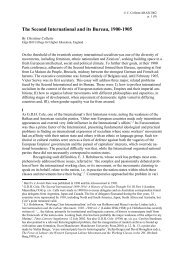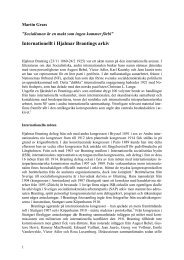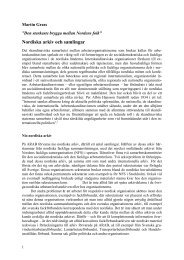Communism, Social Democracy and the Democracy Gap
Communism, Social Democracy and the Democracy Gap
Communism, Social Democracy and the Democracy Gap
You also want an ePaper? Increase the reach of your titles
YUMPU automatically turns print PDFs into web optimized ePapers that Google loves.
© S. Berger/ARAB 2002<br />
p. 12 (14)<br />
resources, especially education, knowledge <strong>and</strong> experience, <strong>and</strong> <strong>the</strong> continued existence of<br />
hierarchic <strong>and</strong> authoritarian structures in society form a distinct hindrance to <strong>the</strong><br />
possibility of democratic learning. 48<br />
A variety of often quite diverse contemporary thinkers have at least begun to<br />
address this problem of involving more people in decision-making processes, 49 <strong>and</strong> a<br />
transformed <strong>Social</strong> <strong>Democracy</strong> is struggling with <strong>the</strong> task of addressing some of <strong>the</strong> key<br />
issues outlined above. 50 Thus, for example, <strong>the</strong> concern with democratisation is a central<br />
ingredient of Anthony Giddens's 'third way'. In his historical analysis, Giddens comes to<br />
<strong>the</strong> conclusion that 'socialism is closely tied up with ideals of democracy … Reformist<br />
socialism … has accepted <strong>the</strong> importance of democracy for socialist goals … <strong>Democracy</strong><br />
essentially offers a framework within which socialist parties can peacefully rise to power<br />
<strong>and</strong> implement <strong>the</strong>ir programme of change.' 51 Indeed <strong>Social</strong> <strong>Democracy</strong>'s record, as far as<br />
democratisation is concerned, has been considerable. They contributed vitally to a<br />
streng<strong>the</strong>ning of parliamentary democracy, not <strong>the</strong> least through franchise reforms. They<br />
fortified a public sphere upholding public freedoms. They championed a civil society<br />
which exp<strong>and</strong>ed workers' rights. They fought for <strong>the</strong> legal recognition of trade unions,<br />
reinforced civil liberties <strong>and</strong> built up welfare legislation entrenching social rights. Not a<br />
mean record by any stretch of <strong>the</strong> imagination.<br />
And yet <strong>the</strong> concern of contemporary analysts, like Giddens, is for <strong>the</strong> need for a<br />
fur<strong>the</strong>r 'democratisation of democracy'. He calls on <strong>the</strong> left to go beyond orthodox liberal<br />
democracy <strong>and</strong> experiment with extending democracy to more social spheres. Ultimately,<br />
Giddens argues, democratisation may well be <strong>the</strong> key means to enhance social cohesion in<br />
Western societies. 52 Calls for ‘democratising democracy’ <strong>and</strong> ‘second-wave<br />
democratisation’ abound in Giddens’s ‘third way’ publications. Decentralisation of<br />
political decision making, constitutional reform (devolution), administrative efficiency,<br />
less bureaucracy, local direct democracy <strong>and</strong> more active citizens’ involvement describe ‘a<br />
form of government which it should be <strong>the</strong> aim of social democrats to promote: <strong>the</strong> new<br />
democratic state.’ 53 Giddens was, of course, not <strong>the</strong> first political philosopher on <strong>the</strong> left to<br />
put democracy centre stage. Margaret Thatcher was just celebrating her third subsequent<br />
election victory, when John Keane suggested that <strong>the</strong> crisis-ridden socialist tradition could<br />
be revitalised by reference to democratic <strong>the</strong>ory. His self-declared aim was to show ‘how<br />
<strong>the</strong> meaning of socialism can <strong>and</strong> must be altered radically – into a synonym for <strong>the</strong><br />
democratisation of civil society <strong>and</strong> <strong>the</strong> state.’ 54 Equally, albeit with different emphases,<br />
Jürgen Habermas has argued at length that socialism needs to be rethought in liberaldemocratic<br />
terms. His <strong>the</strong>ory of communicative action is still at <strong>the</strong> basis of how citizens<br />
can seek consensus <strong>and</strong> achieve communal fraternity. 55 But, more recently, Habermas has<br />
also stressed <strong>the</strong> importance of liberal freedoms <strong>and</strong> bourgeois rights. After all, Habermas<br />
maintains, <strong>the</strong> question of how power is organised is not solved by decisions on who holds<br />
48 Adrian Oldfield, 'Citizenship: An Unnatural Practice'', in: Political Quarterly 61 (1990), pp. 177-87.<br />
49 Edmund Neill, 'British Political Thought in <strong>the</strong> 1990s', in: Stefan Berger (ed.), Labour <strong>and</strong> <strong>Social</strong> History<br />
in Great Britain: Historiographical Reviews <strong>and</strong> Agendas 1990 to <strong>the</strong> Present, Mitteilungsblatt des Instituts<br />
für soziale Bewegungen 28 (2002), pp. 167-84.<br />
50 Herbert Kitschelt, The Transformation of European <strong>Social</strong> <strong>Democracy</strong> (Cambridge 1994).<br />
51 Anthony Giddens, Beyond Left <strong>and</strong> Right: The Future of Radical Politics (Cambridge 1994), pp. 59, 62.<br />
52 Giddens, Beyond Left, pp.104-33.<br />
53 Anthony Giddens, The Third Way. The Renewal of <strong>Social</strong> <strong>Democracy</strong> (Cambridge 1998), pp. 70-7, <strong>and</strong><br />
idem, The Third Way <strong>and</strong> its Critics (Cambridge 2000), pp. 58 ff.<br />
54 John Keane, <strong>Democracy</strong> <strong>and</strong> Civil Society. On <strong>the</strong> Predicaments of European <strong>Social</strong>ism, <strong>the</strong> Prospects for<br />
<strong>Democracy</strong> <strong>and</strong> <strong>the</strong> Problem of Controlling <strong>Social</strong> <strong>and</strong> Political Power (London 1987), p. xiii.<br />
55 Jürgen Habermas, The Theory of Communicative Action, 2 vols (New York 1989); see also Axel Honneth<br />
<strong>and</strong> Hans Joas (eds), Communicative Action: Essays on Jürgen Habermas's Theory of Communicative<br />
Action (Harvard 1991).
















